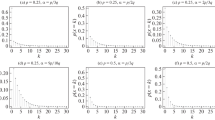Abstract
In this chapter we discuss the theoretical aspects of Estimation of Distribution Algorithms (EDAs). We unify most of the results found in the EDA literature by introducing them into two general frameworks: Markov chains and dynamical systems. In addition, we use Markov chains to give a general convergence result for discrete EDAs. Some discrete EDAs are analyzed using this result, to obtain sufficient conditions for convergence.
Access this chapter
Tax calculation will be finalised at checkout
Purchases are for personal use only
Preview
Unable to display preview. Download preview PDF.
Similar content being viewed by others
References
Baluja, S. (1994). Population-based incremental learning: A method for integrating genetic search based function optimization and competitive learning. Technical Report CMU-CS-94–163, Carnegie Mellon University.
Berny, A. (2000a). An adaptive scheme for real function optimization acting as a selection operator. In Yao, X., editor, First IEEE Symposium on Combinations of Evolutionary Computation and Neural Networks.
Berny, A. (2000b). Selection and reinforcement learning for combinatorial optimization. In Schoenauer, M., Deb, K., Rudolph, G., Yao, X., Lutton, E., Merelo, J. J., and Schwefel, H.-P., editors, Lecture Notes in Computer Science 1917: Parallel Problem Solving from Nature - PPSN VI, pages 601–610.
Cestnik, B. (1990). Estimating probabilities: A crucial task in machine learning. Proceedings of the European Conference in Artificial Intelligence, pages 147–149
Cooper, G. F. and Herskovits, E. A. (1992). A Bayesian method for the induc-tion of probabilistic networks from data. Machine Learning, 9:309–347.
De Bonet, J. S., Isbell, C. L., and Viola, P. (1997). MIMIC: Finding optima by estimating probability densities. Advances in Neural Information Processing Systems, Vol. 9.
Etxeberria, R. and Larrañaga, P. (1999). Global optimization with Bayesian networks. In II Symposium on Artificial Intelligence. CIMA F99. Special Session on Distributions and Evolutionary Optimization, pages 332–339.
González, C., Lozano, J. A., and Larrañaga, P. (2001a). The converge behavior of PBIL algorithm: a preliminary approach. In Kurková, V., Steel, N. C., Neruda, R., and Kárnÿ, M., editors, International Conference on Artificial Neural Networks and Genetic Algorithms. ICANNGA-2001, pages 228–231. Springer.
González, C., Lozano, J. A., and Larrañaga, P. (2001b). Analyzing the PBIL algorithm by means of discrete dynamical systems. Complex Systems. In press.
Heckerman, D., Geiger, D., and Chickering, D. M. (1995). Learning Bayesian networks: The combination of knowledge and statistical data. Machine Learning, 20:197–243.
Höhfeld, M. and Rudolph, G. (1997). Towards a theory of population-based incremental learning. In Proceedings of the 4th International Conference on Evolutionary Computation, pages 1–5. IEEE Press.
Larrañaga, P., Etxeberria, R., Lozano, J. A., and Peña, J. M. (2000a). Combinatorial optimization by learning and simulation of Bayesian networks. In Proceedings of the Sixteenth Conference on Uncertainty in Artificial Intelligence, pages 343–352. Morgan Kaufmann.
Larrañaga, P., Etxeberria, R., Lozano, J. A., and Peña, J. M. (2000b). Optimization in continuous domains by learning and simulation of Gaussian networks. In Wu, A. S., editor, Proceedings of the 2000 Genetic and Evolutionary Computation Conference Workshop Program, pages 201–204.
Mahnig, T. and Mühlenbein, H. (2000). Mathematical analysis of optimization methods using search distributions. In Wu, A. S., editor, Proceedings of the 2000 Genetic and Evolutionary Computation Conference Workshop Program, pages 205–208.
Mühlenbein, H. (1998). The equation for response to selection and its use for prediction. Evolutionary Computation, 5:303–346.
Mühlenbein, H. and Mahnig, T. (1999). FDA - a scalable evolutionary algorithm for the optimization of additively decomposed functions. Evolutionary Computation, 7(4):353–376.
Mühlenbein, H., Mahnig, T., and Ochoa, A. (1999). Schemata, distributions and graphical models in evolutionary optimization. Journal of Heuristics, 5:215–247.
Mühlenbein, H. and Paaß, G. (1996). From recombination of genes to the estimation of distributions I. Binary parameters. In Lecture Notes in Computer Science 1411: Parallel Problem Solving from Nature - PPSN IV, pages 178–187.
Pelikan, M. and Goldberg, D. E. (2000a). Hierarchical problem solving and the Bayesian optimization algorithm. In Whitley, D., Goldberg, D., Cantú-Paz, E., Spector, L., Parmee, I., and Beyer, H.-G., editors, Proceedings of the Genetic and Evolutionary Computation Conference, pages 267–274. Morgan Kaufmann.
Pelikan, M. and Goldberg, D. E. (2000b). Research on the Bayesian optimization algorithm. In Wu, A. S., editor, Proceedings of the 2000 Genetic and Evolutionary Computation Conference Workshop Program, pages 212–215.
Pelikan, M., Goldberg, D. E., and Cantú-Paz, E. (1999). BOA: The Bayesian optimization algorithm. In Banzhaf, W., Daida, J., Eiben, A. E., Garzon, M. H., Honavar, V., Jakiela, M., and Smith, R. E., editors, Proceedings of the Genetic and Evolutionary Computation Conference GECCO-99, volume 1, pages 525–532. Morgan Kaufmann.
Pelikan, M., Goldberg, D. E., and Sastry, K. (2000a). Bayesian optimization algorithm, decision graphs, and Occam’s razor. Technical Report I11iGAL Report 200020, University of Illinois at Urbana-Champaing.
Pelikan, M., Goldberg, D. E., and Cantú-Paz, E. (2000b). Bayesian optimization algorithm, population sizing, and time to convergence. In Whitley, D., Goldberg, D., Cantú-Paz, E., Spector, L., Parmee, I., and Beyer, H.-G., editors, Proceedings of the Genetic and Evolutionary Computation Conference, pages 275–282. Morgan Kaufmann.
Vose, M. D. (1999). The simple genetic algorithm: Foundations and theory. MIT Press.
Author information
Authors and Affiliations
Editor information
Editors and Affiliations
Rights and permissions
Copyright information
© 2002 Springer Science+Business Media New York
About this chapter
Cite this chapter
González, C., Lozano, J.A., Larrañaga, P. (2002). Mathematical Modeling of Discrete Estimation of Distribution Algorithms. In: Larrañaga, P., Lozano, J.A. (eds) Estimation of Distribution Algorithms. Genetic Algorithms and Evolutionary Computation, vol 2. Springer, Boston, MA. https://doi.org/10.1007/978-1-4615-1539-5_6
Download citation
DOI: https://doi.org/10.1007/978-1-4615-1539-5_6
Publisher Name: Springer, Boston, MA
Print ISBN: 978-1-4613-5604-2
Online ISBN: 978-1-4615-1539-5
eBook Packages: Springer Book Archive




